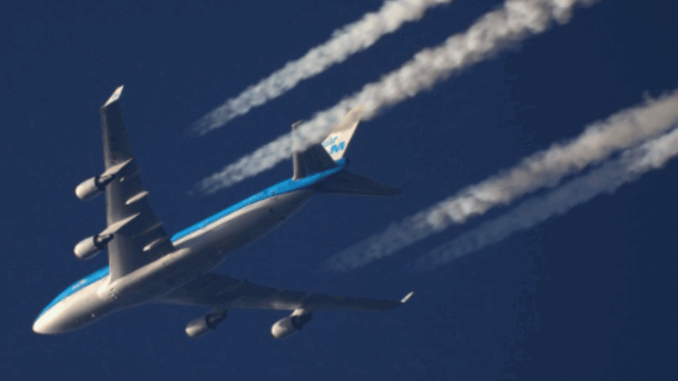Baxter Dmitry
Beginning in October, Florida’s public airports will be legally required to file monthly reports detailing any aircraft, pilots, or operations involved in weather modification — including those associated with chemtrail-related activity — or face the loss of state funding under a new law.
Airports that fail to comply with the new reporting requirements risk losing access to state funding, while pilots and operators caught dispersing unauthorized substances into the atmosphere could face felony charges and substantial fines — penalties that Florida officials say underscore the gravity of the threat posed by covert weather modification.
Signed by Gov. Ron DeSantis in June, the law prohibits the release of any substances into the atmosphere for the purpose of altering weather, temperature, climate, or sunlight intensity. Under the statute, airports must identify any aircraft “equipped with devices or components that release substances or chemicals” for those purposes and submit records of related flights and personnel to the Florida Department of Transportation.
The Florida Department of Environmental Protection is also launching a public portal to report suspected violations, adding an enforcement layer supporters say is long overdue.
Attorney General James Uthmeier notified airport operators in a letter Monday that their full compliance is essential to “catch those who seek to weaponize science” and to protect the public from “harmful chemicals and experiments.”
“We need your help to keep our state free and make sure the skies belong to the people — not to private contractors, corporate experiments, or climate extremists,” Uthmeier wrote. “In Florida, we don’t jeopardize the public health so that we can bend the knee to the climate cult.”
The law is Florida’s strongest move yet to end chemtrails and chemical sprays from aircraft tied to secretive climate or population control efforts. While mainstream sources dismiss the claims as conspiracy, supporters say the law brings needed transparency to unchecked atmospheric experiments.
The law drew national attention and sharp criticism from some lawmakers. “This bill is crazy to me,” said State Rep. Ashley Gantt, D-Miami, during legislative debate. “We’re asking in this bill to do something that is not happening in Florida,” she said. “There’s a phrase … ‘Go outside and touch some grass.’ We need to get grounded.”
But Uthmeier suggested otherwise, pointing to severe weather events like the recent Texas floods, which killed more than 100 people, as possible consequences of human interference in the atmosphere. He did not cite specific evidence but said weather modification “could have played a role.”
Florida has technically required weather modification licenses since 1957, but the Department of Environmental Protection said it has never issued a license or received an application.
Major Florida airports, including Orlando International, Orlando Executive, and Orlando Sanford, confirmed receipt of the attorney general’s letter and said they will comply with the new reporting rules.
“Neither airport performs any geoengineering or weather modification activities, nor are we aware of any activity on airport properties that must be reported at this time,” said Angela Starke, a spokesperson for the Greater Orlando Aviation Authority.
The new reporting mandate is expected to apply to any aircraft engaged in cloud seeding, solar radiation management, or any experimental aerosol deployment, whether by government, academic, or private entities.
The law also sparked opposition from figures in the weather modification industry. Augustus Doricko, CEO of Rainmaker Technology Corp., a cloud seeding startup, testified that while no such operations are occurring in Florida, they could be used in the future to increase water supplies safely.
The National Oceanic and Atmospheric Administration issued a statement last October clarifying that it “does not modify the weather, nor does it fund, participate in or oversee cloud seeding or any other weather modification activities.” The agency acknowledged past efforts, such as Project STORMFURY (1962–1982), which unsuccessfully attempted to weaken hurricanes through seeding.
Despite assurances from federal agencies, supporters of the Florida law argue that secretive climate engineering experiments are increasingly plausible and must be addressed. For them, the law marks a step toward reclaiming public control over the skies and preventing what they describe as a coordinated, unaccountable effort to manipulate the environment without informed consent.
[…]
Click this link for the original source of this article.
Author: stuartbramhall
This content is courtesy of, and owned and copyrighted by, https://stuartbramhall.wordpress.com and its author. This content is made available by use of the public RSS feed offered by the host site and is used for educational purposes only. If you are the author or represent the host site and would like this content removed now and in the future, please contact USSANews.com using the email address in the Contact page found in the website menu.








